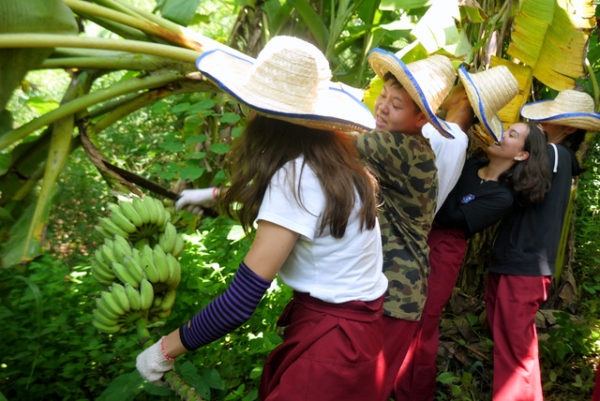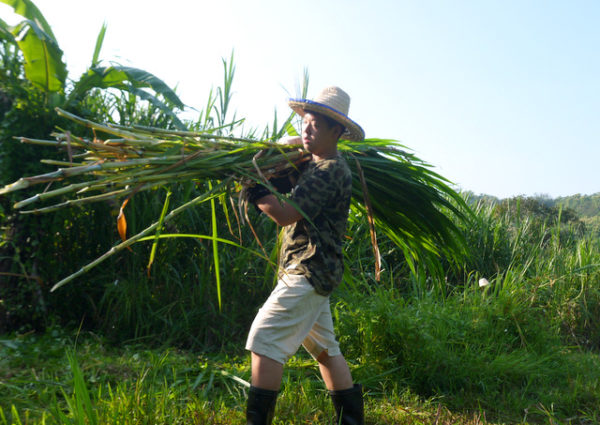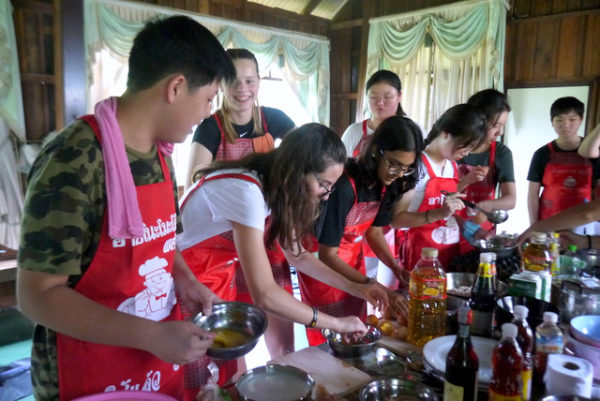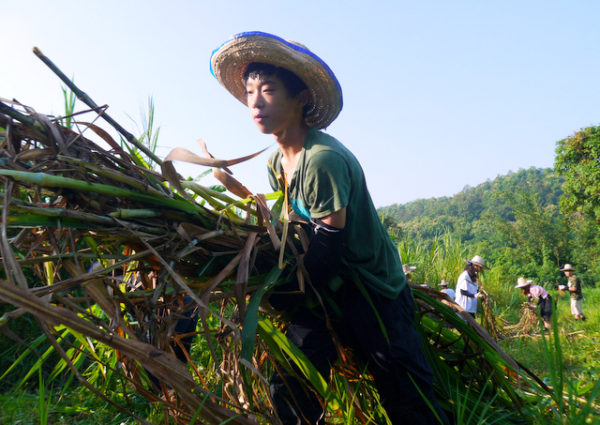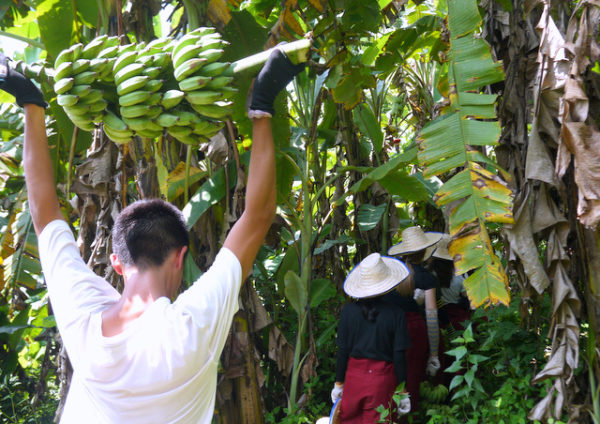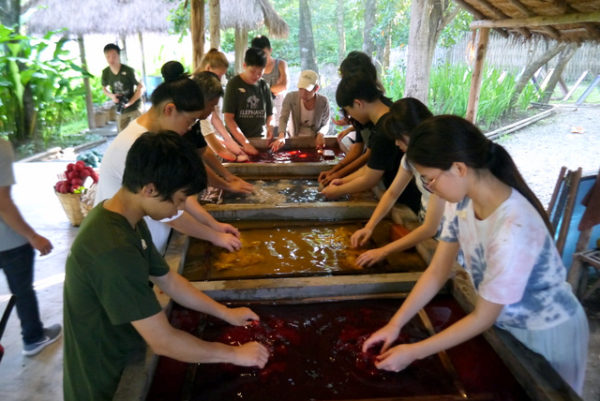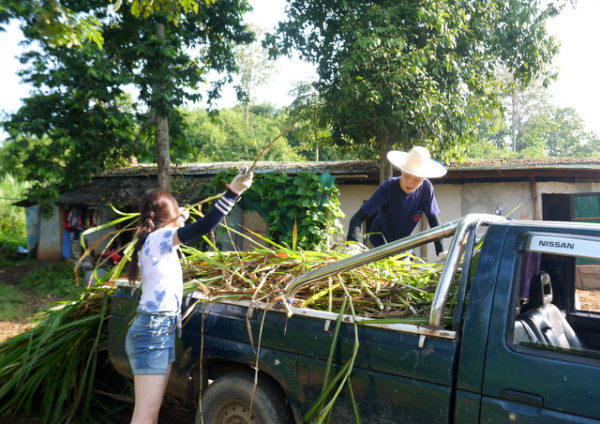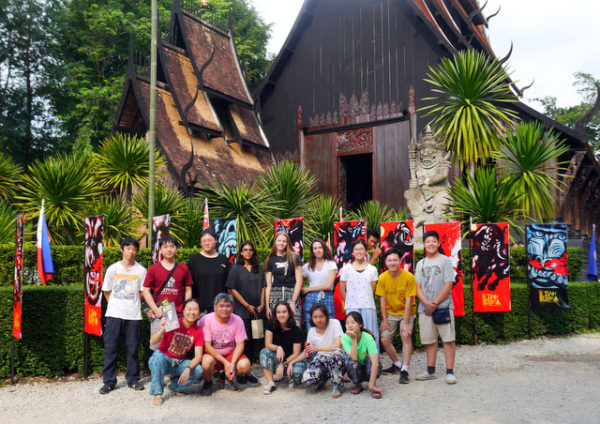DP STUDENTS THINK & ACT GLOBALLY
An unforgettable CAS-trip to Chiang Mai, Thailand
DP1 Sophie
During the trip, through the activities I did, I was able to achieve three CAS learning outcomes. The first was being able to demonstrate the skills and recognize the benefits of working collaboratively. I was able to achieve this outcome considering that many of the activities I did were collaborative activities in which I had to work well with others to take care of the elephants and complete tasks efficiently and successfully.
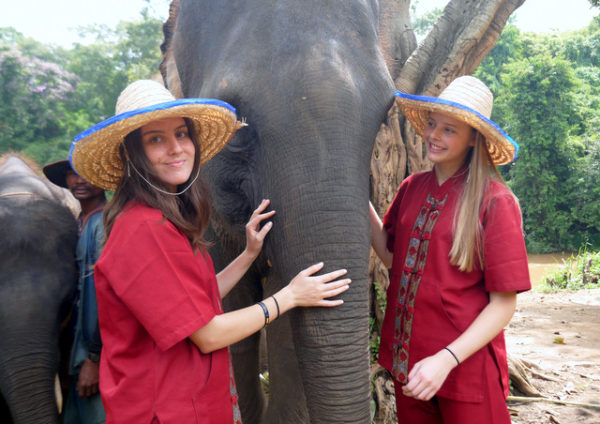
Some examples of this include cutting grass for the elephants in small groups or when we had to make vitamin balls for the elephants by working together to complete all of the different steps involved. The second CAS learning outcome I was able to achieve was demonstrating engagement with issues of global significance. I achieved this outcome by engaging with the issues of elephant tourism and mistreatment through learning about this issue from mahouts, and also by helping to take care of mistreated elephants in the Elephant Rescue Park. Furthermore, I will now continue to engage with this global issue, as I will be choosing a way to share the learning experience I had with the QAIS community.
The last learning outcome I was able to achieve was recognizing and considering the ethics of choices and actions. I was able to achieve this outcome by reflecting on the role others, and myself played in the issue of elephant tourism but also in issues about the environment as a whole. For example, I reflected on how tourists, myself included, are the ones who allowed the cruel mistreatment of elephants to continue considering that they valued the memorable experience of riding an elephant more than the health and happiness of animals. Another example is that after visiting the Elephant Poo Poo Paper Park, I realized that in many ways, we are deliberately not choosing to use the products that are the most environmentally friendly because we value our comfort and preferences over the environment. Specifically, in the case of the Elephant Poo Poo Paper Park, we are using non-recycled paper because we like the aesthetic more. I think even further to maximize the learning outcomes of the trip; more emphasis can be put on doing meaningful work and labour. For example, walking the elephants to feeding spots was an opportunity to learn to appreciate elephants; however, the task we were doing as not essential to the care of the elephants, whereas cutting grass, feeding them and doing construction to their living spaces was.
Overall, I enjoyed the trip, and I am grateful for the experience. I believe the trip was immensely meaningful due to the learning I have done and the learning outcomes I have been able to achieve. Moreover, I also really enjoyed the trip because of the opportunity it gave me to get to know the students in DP1 and DP2 more to help me overcome the shyness I still had as a new student. The trip allowed me to gain confidence that will help me better be apart of the QAIS community when we return to school.
DP 2 Angie
The learning outcomes I wanted to achieve at the beginning of the trip were: to demonstrate engagement with issues of global significance, recognize and consider the ethics of choices and actions, and demonstrate the skills and recognize the benefits of working collaboratively. At the end of the trip, I was sure that that took place during the trip.
To begin with, the global issue that was at the core of the trip was animal mistreatment and more specifically, the mistreatment of elephants. By interacting with the elephants and communicating with the owner of the rescue park, I was able to learn about the issue and its consequences.
Secondly, I was able to see that although actions such as riding elephants while travelling are seemingly innocent, it has a negative consequence and deserves ethical consideration. For us, when we travel, we only see the elephant carrying one passenger for a couple of minutes. However, for them, they need to carry heavy weights all day without any breaks. The more passengers they are able to carry, the more money the owner is able to earn. Not only this, but something else we do not see is the many years of mistreatment, taming, and brainwashing that the elephants must go through before being able to carry passengers. This puts our small decisions and actions we consider minor into perspective and gives us a chance to think about the ethical implications of it all.
In addition, I was also able to work collaboratively. While doing activities such as cutting bananas, elephant grass, and creating vitamin balls for the elephants, we worked closely together. Many of these activities could not be completed independently. For example, while cutting bananas, even though only one person was doing the actual cutting, there needed to be at least 3 other people holding the tree and supporting the person who had to cut the banana. Otherwise, the bananas would fall to the ground and break!
Overall this trip provided an opportunity for me to complete activities that addressed creativity, activity, and the service aspects of CAS. The purpose of CAS is to develop meaningful experiences alongside academic studies; this experience was insightful, educational, and opened my mind.
During the Chiang Mai CAS trip, I was able to learn a lot about the relationship between humans and the environment. I have always been someone who is not so interested in animals or nature. As a result, I was always drawn to address issues that pertain to humans as opposed to helping solve issues that relate only to animals and nature. With the increasing awareness of climate change, my mindset on caring for the environment has changed drastically throughout recent years; however, I still always felt less connected to animals, especially wild animals like elephants. Through working so intensively and closely with elephants during the trip, I care more for elephants and other wild animals. I now feel motivated to learn about issues and address issues that relate to animals, and not only to humans.
Moreover, through staying in rural Chiang Mai and experiencing the care Thai people have for the environment as a result of their religion, I am developing a new appreciation for the value of nature and animals. I have learned how fragile the relationship is between humans and nature, and how easy it is for this relationship to become unbalanced; causing one of the two to suffer because of the other. Meeting the people who work at the Elephant Rescue Park and seeing how well they had adapted to their environment to coexist with it in harmony instead of feeling compelled to suppress and destroy it, made me think about how in so many urbanized areas of the world, this harmonic relationship no longer exists. In most places, humans have found a way to control the environment and the animals around them, rather than adapt to them. It made me realize that in many ways, the relationship between humans and nature has become toxic and to fight issues like endangered species and global warming, the balance of this relationship needs to be restored.
The Thai culture and the Elephant Rescue Park I engaged with during the trip has taught me that although this restoration is difficult, it is possible as long as we decide to simply care about animals and the environment as opposed to only caring about ourselves and other humans.
